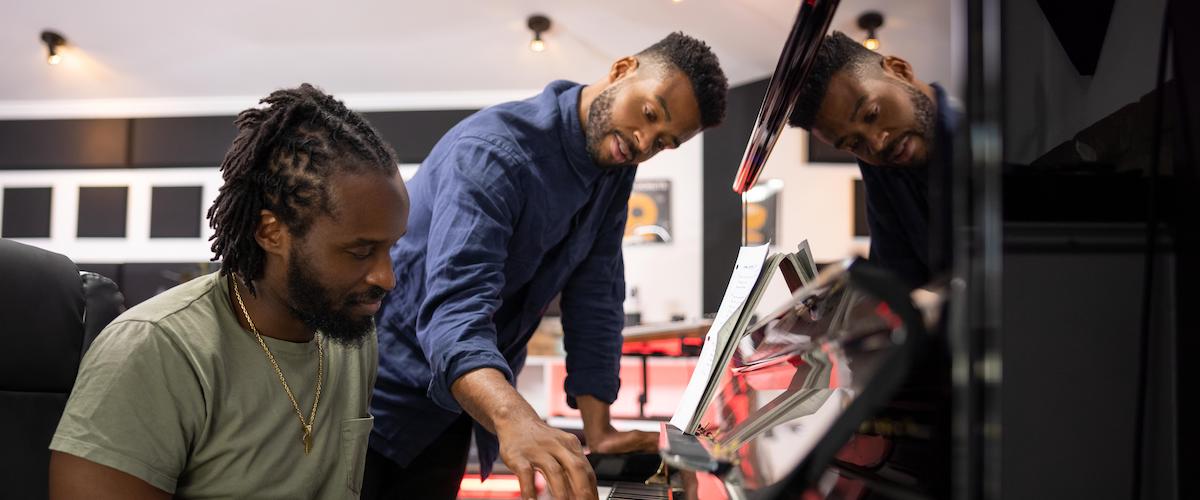America is often ridiculed internationally for its affinity for the flag. A symbol of patriotism hung outside of homes, worn on shirts, pasted on bumper stickers, etc., the flag is an omnipresent force in the visual fabric of America. Yet what has garnered quite a bit of controversy over the past few years is another similarly revered symbol: the anthem, alongside its cultural rejection. Whether it’s kneeling as it plays or refusing to sing along, the simplest of actions are powerful displays of opposition and touchy subjects for the country’s most loyal “patriots.”
Of course, this disillusion is rooted in the systemic oppression of anyone outside the majority. Produced by Ryan Coogler, director Peter Nicks’ documentary “Anthem” follows composer Kris Bowers (“Brigerton,” “Green Book”) and producer D.J. Dahi (“Self Care” by Mac Miller, “Money Trees” by Kendrick Lamar) as they trek across America, looking to reinvent the anthem.
The documentary takes the format of a road film as Dahi and Bowers travel to American genre centers like Nashville, Detroit, and the Bay Area, meeting with musicians and discussing their love for the art form. All of these individuals perform and relay the histories, importance, and qualities of their genres. Across all groups, the sentiment is the same: music is love, music brings people together, and the anthem doesn’t truly accomplish either.
As they travel the country interviewing a breadth of artists, every interaction is marked by a bothersome sense of artifice. There’s a lack of genuine chemistry within the conversations, and it feels more like checking boxes than thoughtfully engaging with the subjects. Dahi and Bowers also lack chemistry and rapport, feeling like two talented students stuck together for a group project.
The camera is always strongly felt by the people in front of the lens, leading to a rigidity that takes the emotion out of the sentiment. It renders these conversations as educational spiels instead of empathetic discussions. The value of what is being said is undeniable, but in a documentary that’s thesis is rooted in empathy and unity, there’s a counterintuitive emotional distance between the subjects that translates even further through the screen.
“Anthem”‘s format is equally formulaic. Dahi and Bowers drive to a city, listen to their subjects play, and then interview them. This repeats itself throughout the documentary, and while it works to get all the information outlined, it’s fatiguing. Perhaps these downfalls result from the film’s ambition, tracking a transnational exploration of music, interviewing figures in the community, and crafting a song to end it all. It’s a lot of information to crush into 98 minutes, and while a longer documentary was a feasible solution, the lack of communion between the subjects is a trickier fix.
However, what is most fascinating about “Anthem” is its investigation into the legacy of “The Star-Spangled Banner” and the hypocrisy that has followed it from its origin. Francis Scott Key wrote the American anthem to the tune of a British song, cementing an off-the-bat philosophical complication that only continues to prove itself in terms of representative problems today.
The project of “Anthem” is special and compelling, but the documentary lets itself down. There is notable neglect to include much of the musical process. We meet gospel singers, country singers, Native singers, jazz singers, etc., but we are hardly privy to how Dahi and Bowers compose the song to include these genres. The conversations between the artists across the country are shown as they write the lyrics and discuss the issue of a hopeful v. critical tone, but the music itself feels forgotten.
There’s a wonderful analogy when Dahi and Bowers visit Detroit, where the jazz musicians reveal the key to their performance. Jazz is a conversation with all the players; they must work together, listen, and know when to play and when to let another player shine. It’s the documentary’s whole philosophy, and while it works on paper, the execution teeters on connecting its feeling to its format.
“Anthem” is a love letter to the art form and the diversity in the country where many of these genres originated, but it fails to fully realize itself. The American fight rears itself against racism and stuck-in-the-mud traditionalism. Naturally, the symbols of these forces are just as hard to change as the minds themselves. “Anthem” takes on this daunting task, making a concerted effort to display the beauty of culture in the United States and music’s intrinsic tie. Yet, while acknowledging the importance of its thesis, it doesn’t fulfill the full empathy required to inspire.
On Hulu today.




















